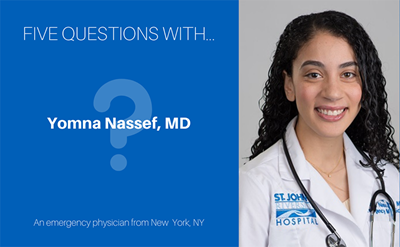Residency is an important time in medical training, working toward independence yet still requiring supervision. I am the only female in my residency class and I have found that being a female resident in the Emergency Department can be difficult at times. But, the challenge has its rewards.
Early on in my training, the pressure was high and there were challenges everywhere. It seemed like I was called on twice as often during didactic sessions because I stuck out. Today, I am questioned more often than my male colleagues when ordering a test or medication. Being a female resident also affects my patient interactions.
I can recall a number of times during discharge procedures when my patients would frequently say, ‘but I never saw a doctor,’ forcing me to explain to them that I was indeed a physician, not a nurse.
After so much invalidation and scrutiny, it should be no surprise that I started doubting myself and questioned whether I was actually cut out to be an emergency physician. It would have been easy for me to quit or to let these thoughts negatively affect my practice or the patient experience I am trained to deliver. But I didn’t.
As I progress through my medical training, I have found that with assertions of self-confidence and positive affirmations, I am able to overcome these doubts. I am defying expectations, busting through tired stereotypes and sexism while I work hard to develop broad medical expertise and learn to be the best emergency physician possible.
Because I am constantly questioned and because I am required to go that extra step to form closer relationships to my patients, because I need to rise above the constant doubt others express in my ability to practice medicine, I have become a better physician.
As I grow into a senior resident and a practicing attending, I want to encourage all of my female colleagues: Let’s continue to raise awareness about gender issues and help address them in the medical workplace.
It is important to constructively confront gender issues as they arise. Avoiding conflict might seem like the easiest approach. However, being an assertive woman can be your best tool to achieve lasting and meaningful change.
Don’t internalize the inequalities of gender. It is easy to self-doubt, but harder to have self-confidence. Keep in mind that you belong in this position as much as any male counterparts. Lastly, remember that residency is a time to learn and work together, mistakes help growth.
To my fellow female emergency physicians, you are not alone in the struggle against gender bias or inequity. Women must work together to provide healthy female role models and to show the world what we are able to accomplish.
Bryn DeKosky ACEP/EMRA Health Policy Fellow and current resident emergency physician at Kent Hospital in Rhode Island.
 American College of Emergency Physicians
American College of Emergency Physicians







